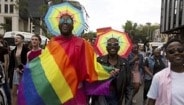The classically liberal Cato Institute in the United States and the Fraser Institute in Canada have launched the latest edition of the Human Freedom Index.
The Index tells many stories, including that the year 2020 saw ‘94 percent of the world’s population’ having less freedom than in 2019, due to the widespread adoption of lockdown policies. What it also shows, however, is that southern Africa is the best place on the continent to be free.
For South Africans in particular, there is rightly much to be despondent about. The African National Congress (ANC) government seems committed to depriving ordinary people of their civil liberties and property, while also undermining their interests with catastrophic state failures including rolling blackouts. Meanwhile, the broad political opposition appears more interested in one-upmanship amongst each other than actually dislodging a government inimical to South Africans’ welfare.
But we must never forget that things could be significantly worse. The new Human Freedom Index (HFI) shows that as far as sub-Saharan Africa is concerned, the southernmost states are among the best places to be free, bested only by Africa’s small islets.
The 2022 HFI is based on 2020 data. It assesses the rule of law; safety and security; freedom of movement, international trade, expression, information, relationships, religion, association, assembly, and civil society; the size of government; the state of the legal system and property rights; sound money; and the extent of regulation.
According to the HFI, the top-10 freest states in sub-Saharan Africa are, in order:
- Cabo Verde, a small group of islands off the north-western coast of Africa
- Seychelles, an even smaller group of islands far off Africa’s eastern coast
- Mauritius, an island east of Madagascar
- Namibia, in southern Africa
- Botswana, in southern Africa
- Ghana, in West Africa
- Benin, in West Africa
- South Africa
- Malawi, in south-central Africa
- Lesotho, in southern Africa
Most of the world saw a decline in civil liberty. In fact, since the high of 2007, human freedom has been in decline everywhere. Nonetheless, the developed states still dominate the top end of the HFI, with Switzerland, New Zealand, Estonia, Denmark, Ireland, Sweden, Iceland, Finland, the Netherlands, and Luxembourg taking the top 10 spots. Seventy-five percent of the world’s population regrettably live in states that rank in the bottom half of the HFI.
The top 10 least free states in sub-Saharan Africa are, with the worst at the bottom:
- Central African Republic
- Swaziland, in southern Africa
- Guinea, in West Africa
- Ethiopia, in East Africa
- Democratic Republic of the Congo, in Central Africa
- Cameroon, in West Africa
- Zimbabwe, in southern Africa
- Chad, in West Africa
- Burundi, in Central Africa
- Somalia, in East Africa
- Sudan, in Central Africa
Some countries, like Eritrea, were omitted from the HFI due to a lack of data. Eritrea is likely to be at or near the bottom.
Zimbabwe and Swaziland are the black sheep in southern Africa, which makes it all the more concerning that the ANC and its Economic Freedom Fighters (EFF) partners seem intent on duplicating the collapse and tyranny that millions have fled to South Africa to escape.
During the period 2000-2020 that the HFI measures, South Africa achieved its best human freedom score in 2012 (7.46 out of 10). That year, South Africa scored high on freedom of movement, religion, association, assembly, expression, information, relationships, and civil society. South Africa’s lowest score was in 2020 (6.93), during which time all those scores fell, joined by even worse rule of law and safety and security scores.
South Africa should hang its head in shame that it has been bested by the likes of Namibia, formerly under South African administration, and Ghana and Benin, both repeatedly subject to military coups. But we should be thankful that we have done as well as we have, certainly due in no small part to an active civil society.
Laws like the Prevention and Combating of Hate Crimes and Hate Speech Bill and the Expropriation Bill would likely have been signed into law in their worst possible forms, had organisations like the Institute of Race Relations, AfriForum, the Free Market Foundation, the Helen Suzman Foundation, and Sakeliga, among many others, not existed.
This does not absolve ordinary citizens of their obligation to be vigilant. It is our own freedom we are talking about, after all. The more eyes that are focused on government abuses and excesses, the better the outcome for liberty will be.
Now that the ANC is facing possible defeat in the 2024 general election, it is even more important for South Africans to ensure the governing party does not adopt brazenly authoritarian measures, or a partnership with the EFF, to secure its own continued reign.
[Photo: AP Photo/Denis Farrell]
If you like what you have just read, support the Daily Friend.

